Jackals' Revenge Read online
Page 18
Hathaway smiled. ‘Just potting a few Jerries, Peter. Your lieutenant’s doing a good job out there. It’s been a bit hairy, mind you. Thank God you came. We’d never have got out. A truck arrived from Pendlebury but with only thirty rifles and barely enough ammo for them. I left most of my Greeks in Karatsos. Did you take many casualties? Oh, I say, you’re hit.’
‘Just a graze.’ Lamb put his hand up and dabbed with a large, spotted handkerchief at the spot just above his right eyebrow where the bullet had gouged a furrow. He was bleeding profusely, but he had been lucky. ‘Two dead, I think, and a few wounded. Plus anyone that Lieutenant Eadie’s lost.’
‘Well, at least we’ve got what we came for.’
‘What you came for? Where? I thought we were saving the King.’
‘No. He’s still at the other house in Perivolia, unless they’ve moved him again. Didn’t my man tell you? Jerry paratroopers were seen landing here, around the villa. I had a signal from Prince Peter to say that the King’s state baubles and some vital paperwork of Tsouderos’ had been left in the house when they moved to the new place. It was imperative that they be got out. That’s why I sent for you. I knew you could do it.’
Hathaway opened a haversack at his feet and pulled out a large gold sceptre. Lamb looked at it, but he could not tell what it was and frankly he did not care. He just stared at Hathaway. ‘Are you telling me that I’ve just lost at least two good men and had several others wounded, not to mention risked other lives, just to save a few pieces of tin?’
‘Come off it, Peter. They’re not exactly tin, are they? These are the King of Greece’s bloody objects of state. They’re irreplaceable. Part of the monarchy. You might say that without them in a way he ceases to be King of Greece. Don’t you get it? What a coup that would have been for the Jerries. For Hitler. They’ve already declared a Greek republic and deposed the monarchy. This would have finished the job almost as well as killing the old man and his cousin. We had to get them back.’
Lamb shouted, ‘Nonsense. He’s the bloody King. This is just a load of old brass. It’s you that doesn’t get it. Christ, look at us. Two dead. Where’s Eadie?’ He yelled from the window above the staccato pop of random bursts of gunfire. ‘Sarnt-Major.’
Hathaway was looking at the medals. ‘Problem now is how to get them to him.’
Lamb turned. ‘You are bloody joking, aren’t you?’
‘’Fraid not, old boy. He can’t govern without them. Not that he’s going to have much hope of doing that in the near future.’
‘You’re going to take the King’s medals to him while men are fighting and dying here to save Crete from the Jerries?’
‘No, you are. I’ve 400 Greeks to look after. You’ve only got a company. It’s vital for Greek morale.’
Lamb was confused. Of course he already had an obligation to save the King, of which Hathaway was unaware, but the last few minutes had made up his mind that his duty to his men and the defence of the island must come first.
Now he boiled over. ‘No, Hathaway. You’re not going to do this to me. I left a platoon of my men on Pink Hill waiting to go into a counter-attack, as ordered by Colonel Kippenberger. Now, as if that wasn’t against all the rules of war, you are asking me to take some crown jewels to a King who has just lost his throne. I won’t do it, and you can’t make me. You’re not my superior.’
Hathaway looked down and stuffed the medals back into the haversack. ‘Funny, I thought you were the man for the job. That’s what the Prince reckoned. I’ll do it, of course, but it’ll leave my entire battalion leaderless, 600 men, at a time when we can use every man we can get.’
Lamb could see when he was being blackmailed. ‘But you said yourself that the Greeks didn’t have enough weapons. Only bayonets, you said.’
‘Yes, I know, but they will soon. Once they’ve picked them up from the dead Jerries. Ammo too. They’ve dropped half of the weapons containers and supplies in our trenches. It won’t be a problem. But if I’m not with them they’ll just drift away again. And right now the Petrol Company needs them back at Pink Hill.’
Lamb knew when he was beaten. What was his meagre company when set against Hathaway’s battalion? If anyone was going to find the King, it would have to be him.
‘All right, I’ll take the bloody things. But before we find the King I’m going back to my men to execute that order. And then – if we survive this mad bloody counter-attack – I’ll find the King and give him his sceptre and the rest.’
He turned to the door. ‘Sarnt Hook, take this bag and keep it safe. The rest of you, come with me. Let’s go and find the lieutenant.’
They made their way back down the staircase and out through the garden room. Lamb paused, bent down over the two dead Germans and the one wounded by Garner who had lost a huge amount of blood. His face was as white as a sheet. He whispered to Lamb, ‘Wasser. Wasser, bitte.’
Lamb turned to Rothman. ‘Find him a drink, will you. From the tap. Use anything.’ Then he reached out to the man and prised his submachine-gun from his hands. It was slick with blood and Lamb took it and wiped it on one of the curtains. Then he returned to the two corpses and took their guns and did the same. As Rothman returned with the water for the dying German, Lamb laid out the three Schmeissers on the wicker table which stood at one end of the room. He picked up each in turn and inspected its mechanism, clicking off their safety catches, checking the barrels and clipping and unclipping the magazines. Then he slung one of the guns over his shoulder and gave the other two to Bunce.
‘There you are, Bunce. Guard those with your life. See what ammo you can find on those two and the other stiffs upstairs. I’ll check the garden.’
The garden smelt of death: cordite, charred wood and burnt flesh. The terrace on which Lamb had strolled with Miranda Hartley the night before was now the resting place of two dead paratroopers, lying in a spreading pool of their own blood, while a third, fourth and fifth, caught in the blast from the grenades, lay mutilated below the charred branches of an almond tree. Two more of them, badly wounded, had crawled off and died beneath a tamarind. Eadie had done well, and Lamb congratulated him. Not only had he cleared the place of Germans in a matter of minutes, he had not lost a single man. Carter had been wounded in the arm and sent off to No. 7 Field Hospital, along with Corporal Simmonds and Griffin, and Eadie himself had been dealt a glancing blow from a bullet on the shin, but the bleeding had stopped and he could walk. Hathaway, sensing that Lamb had nothing more to say to him, made off for Karatsos with his Greeks, while Lamb, having picked up his own irregulars on the main road, detailed Corporal Hale and a dozen Greeks to bury the dead and follow on and led his men away down the Canea–Alykianou road, back towards Pink Hill.
He walked in silence, still fuming at Hathaway’s behaviour. They travelled as quickly as they could, keeping an eye out all the time for any rogue paratroops, but all that they met were dead. They lay at the roadside in crumpled heaps, often missing their boots, looted by Allied troops, or entangled in their parachutes where they had fallen, dead before impact. Lamb felt in poor spirits and walked on next to Bennett, saying nothing, but the Greeks were full of the victory at the villa and insisted on singing.
As they neared Pink Hill, though, Lamb sensed that something had changed. Climbing back up the slopes, he struggled to find their original trenches and realised they were empty. The hill was almost entirely silent, save for a first-aid post in the New Zealand lines off to the right. He scrambled up the hill to a vantage point and looked out towards the prison, and there in the valley he saw what he had feared. The valley was filled with columns of smoke and where before there had been trees were now stumps, and among them dozens of bodies.
‘Jesus, no.’
Through the half-light Lamb saw a party of men coming towards him slowly, up the hill. Sergeant Mays was walking at the head of a mass of walking wounded, his men and Greeks, while behind them came the others. Mays was holding his right arm, which was bleeding, and he had
a deep gash across his forehead.
‘Mays, what in heaven’s name’s happened? Where’s Mr Wentworth?’
‘Thank God you’re here, sir. Major Basset came to find you. From the colonel. Told Mr Wentworth the enemy were making a landing ground by the prison, to bring in reinforcements by plane. Said we needed more men to press home a counter-attack, and wondered where you had gone. Then the tanks arrived and began to move down the valley with some of the New Zealand lads. Mr Wentworth just got up and said, “Come on, let’s go.” It was bloody murder, sir. For them and us. Never seen nothing like it. We moved down the hill just as it was getting dark. We kept finding paratroops in holes. They just opened fire on us. We’d go on for a bit and another would fire and then we’d get him. It was bloody hard going, but we mopped them up. I think we killed about twenty of the buggers. But we lost some men too, sir. I suppose we were about 800 yards north of the prison when this Kiwi officer came up and told us to dig in. Mr Wentworth asked him why, and the officer said we would carry on in the morning. Didn’t make sense, sir. We knew we’d be pinned down. Then one of the tanks got hit, square on, just blew up. And that was when Mr Wentworth copped it too.’ He dropped his eyes.
‘He’s dead?’
‘Yes, sir. Hit by a mortar.’
‘Who else?
‘Same blast got Corporal Vincent. Smithy lost his leg. Then there was Davies, Maggs and Corrie, and about a dozen of the Greeks. We’ve got a few wounded, sir, and Corporal Hughes is hurt pretty bad.’
Lamb cursed. ‘Well done, Mays. Get yourself to the MO.’
He had known he shouldn’t leave them, but he’d thought Wentworth would wait for his return. He should have known the lad would want to go. The attack had been ludicrous and badly mismanaged. But what could he say to Bassett or the colonel? He was the one in the wrong. He had effectively disobeyed an order and had not been there when required. Wentworth’s death, and those of his men, had been no one’s fault but his.
11
Wednesday 21 May dawned as it always did, under a cloudless sky. In the trenches the men stretched and scratched and spat and tried to find water with which to wash their faces and swill out parched mouths. They scraped together what food they could and took a swig from half-empty canteens. Then they turned, as refreshed as they could be, to face another day.
Lamb, however, was far from refreshed. It had been a sleepless night. He had posted sentries around the trenches but had been unable to find any rest himself. His mind had been filled with the image of endless parachutes coming down and the imagined vision of poor Hugh Wentworth and his men, sacrificed for nothing, as far as he could see. He saw Hathaway’s haversack close by in the trench and wondered what new horrors and follies the coming day would bring. He had no idea, either, what had become of Anna, whether she might even still be alive. Perhaps, he thought, he might contrive to get to Galatas somehow and find out, although he also wondered how, in the light of yesterday’s débâcle, he would ever extricate himself from the trenches. He knew, though, that he would have to do so. There was the urgent need to find the King. Perhaps he too was dead. Half of him still considered it a pointless mission, even though he had been ordered to do so by Colonel ‘R’ in Athens. Things had changed since then, hadn’t they?
It was plain to Lamb that they would be better to remain with the Petrol Company and defend the hill against the inevitable German attack, but he knew Hathaway had passed him a poisoned chalice and that, given his original orders, there was nothing he could do to avoid at least attempting to find King George. The medals and the papers must be returned to their owners, otherwise Lamb was well aware he might find himself in deeper trouble than he evidently was in already.
Reports had come in throughout the night, and as the men began to stir and think of breakfast Eadie approached him. ‘Situation stable, sir. Has been all night.’
‘Good.’
‘Shame about Hugh, sir.’
‘Yes, it is a bloody shame. Just too bad. What’s the sitrep with the Kiwis?’
‘The Petrol Company’s back in its own lines, sir. The enemy’s gone from the bottom of the hill. Just pulled out. Back in the cemetery, according to the patrols.’
‘That’s something. You’re looking tired, Charles. Bearing up?’
‘I’ll manage, sir. At least I’m still here.’
It was not intended to be a pointed remark. Charles Eadie had the greatest respect for his commanding officer. But Lamb felt the words prick his conscience. It had been his fault, he was sure, that Wentworth had died. He looked at Eadie and saw no hint of malice, but still the comment had done its work.
‘I should keep the men on the alert. Something’s sure to boil up.’
As Eadie returned to his trench, Smart poured a kettle of hot water into a tin bowl and Lamb tried shaving, using a blade that had seen better days and a piece of cracked mirror glass as a guide. Smart was an adept scrounger and Lamb wondered from which bar he had liberated the mirror. He splashed water on his newly smooth face and instantly felt better for it.
Smart presented him with a cup of tea.
‘Thank you.’ Lamb took a sip and dried his face, dabbing at the two inevitable cuts made by the razor. ‘Sarnt-Major.’
Bennett doubled over to him. ‘Sir.’
‘I need a proper situation report. Everything. Status, numbers, dispositions and ammo. As soon as you like, Sarnt-Major.’
‘Sir.’
‘Smart, I don’t suppose for a minute you’ve anything on that bloody WT?’
‘No, sir, not for days. Reckon it’s all them mountains, sir. Never had this in the desert, sir, but this island’s different. Blooming great mountains all over the shop.’
Lamb wished he knew the situation in other parts of the island, and also wondered what the plans were for a possible evacuation, should the Germans succeed in taking the island. He was considering sending out a runner to General Freyberg’s HQ at Canea, or at least seeing if he could discover what Kippenberger thought, when a Greek boy in his early teens came bounding through the olive grove from the north. Lamb recognised him as being from Galatas. ‘Kapitan Lamb, Kapitan Lamb.’
Lamb called hello to him. ‘Yasou. Over here.’
The boy smiled at him and Lamb knew him at once. ‘Yasou, Kapitan Lamb. I come from my sister, Anna Levandakis. She says to tell you she is safe. Do not worry.’ The boy smiled again as he saw that Lamb understood.
‘Thank you. Tell her I am safe also.’ The boy saw the bandage on Lamb’s head and pointed at it with a frown.
Lamb shook his head. ‘It’s nothing, Andreas. It’s just a scratch. Don’t tell your sister.’ The boy smiled again, nodded and ran back into the olive trees towards the village.
That at least, thought Lamb, was a relief. But while Anna might think she was safe, there was surely no guarantee of it. The dead paratroopers by the roadside on their way to Perivolia, not to mention the battle in the villa, had been proof that the enemy could be anywhere. He buttoned his shirt, walked over to the command trench and found a map. Carefully peeling back its almost ripped folds, he tried to work out where the enemy might have planned to drop. Clearly the prison at Agya was a key objective, but so, it seemed, was Canea and the heights where they now were above Galatas. He presumed the drop would not have been localised. There would have been other, similar assaults across the island, many dozens of them, probably, judging from the number of planes in the sky yesterday. There must now, he surmised, be similar fights to this one at Pink Hill going on at Heraklion and Maleme, for control of the airfields. Pendlebury would be in his element now. Bandouvas too, he thought, must have mobilised his men, and Lamb wondered where they would be. He would have been glad of their presence alongside his own. His principal concern, though, was the whereabouts of the King. Hathaway had not given him a clue as to where he might be, and Lamb cursed his own pride for not having asked him what if anything he knew.
He saw Bassett hurrying through the trees towards him. The majo
r looked weary and flustered. ‘Captain Lamb, a word if you will.’
Lamb walked across to the major, who had stopped in the shade of an olive tree. He looked at Lamb and rubbed at his red-rimmed eyes. Then he began. ‘Captain Lamb, will you kindly explain to me what the bloody hell you thought you were doing leaving your post? Particularly after you had received an order telling you to expect to counter-attack at any moment?’
‘I’m sorry, sir. I had another request to reinforce a position to the rear, at Perivolia. It was under attack, sir.’
‘That’s no reason to desert your own position. What position at Perivolia? Who gave you the order?’
‘Captain Hathaway, sir.’
‘Hathaway? Dammit, Lamb, Hathaway’s only a captain like you, man. Why did you take an order from him? Are you trying to be funny, Lamb?’
‘No, sir. Not at all. It was the King’s house, sir. The King of Greece. Captain Hathaway led me to believe that the King of Greece was in danger. I took two platoons of my men to save him.’
‘And was he? Was the King in danger? Did you save him?’
Lamb paused. ‘No, sir. He wasn’t. We didn’t.’
Bassett shook his head. ‘No. And I’ll bet he wasn’t even there.’
‘Sir.’
‘Christ, Lamb. I took you for a bloody good officer. God knows you’re brave enough. But this time you’ve been a bloody fool. It’ll have to go down in the Brigade order book, you know. You might be in the British army and not the New Zealand, but here you’re attached to us, and under our orders. If we get away from this lot I dare say you’ll still be in trouble, Lamb. Do you understand what I’m saying?’

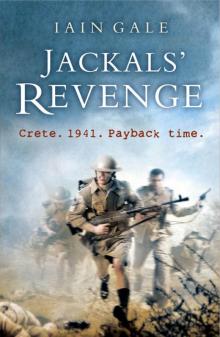 Jackals' Revenge
Jackals' Revenge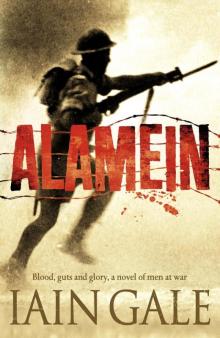 Alamein
Alamein Conspiracy
Conspiracy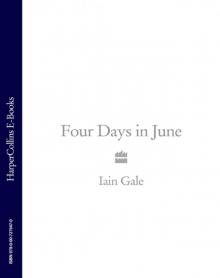 Four Days in June
Four Days in June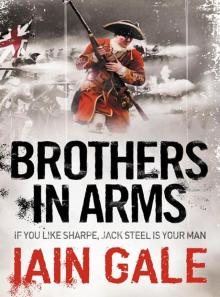 Brothers in Arms (Jack Steel 3)
Brothers in Arms (Jack Steel 3) Brothers in Arms
Brothers in Arms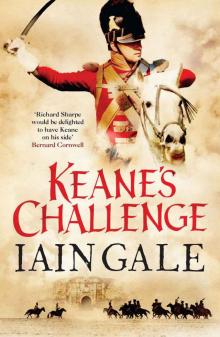 02 - Keane's Challenge
02 - Keane's Challenge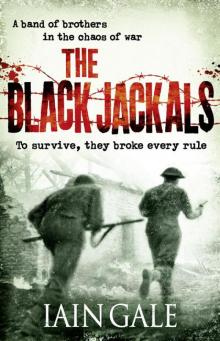 The Black Jackals
The Black Jackals Man of Honour
Man of Honour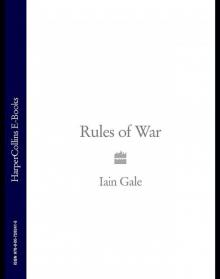 Rules of War
Rules of War